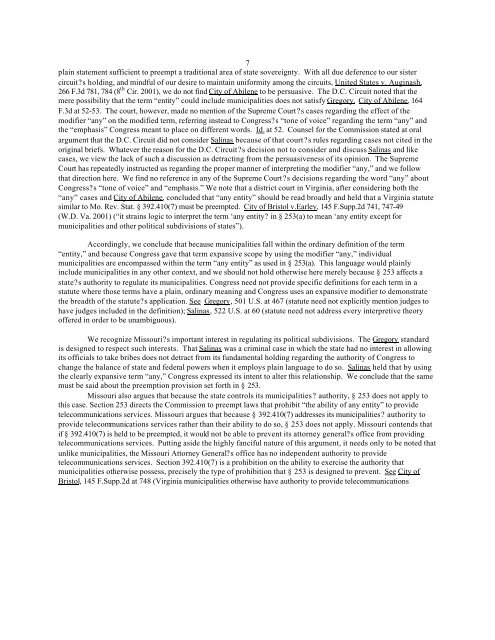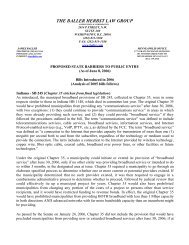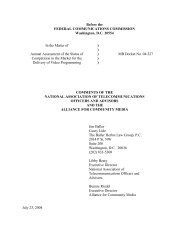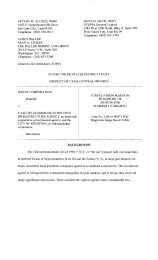Petition for Writ of Certiorari
Petition for Writ of Certiorari
Petition for Writ of Certiorari
Create successful ePaper yourself
Turn your PDF publications into a flip-book with our unique Google optimized e-Paper software.
7<br />
plain statement sufficient to preempt a traditional area <strong>of</strong> state sovereignty. With all due deference to our sister<br />
circuit?s holding, and mindful <strong>of</strong> our desire to maintain uni<strong>for</strong>mity among the circuits, United States v. Auginash,<br />
266 F.3d 781, 784 (8 th Cir. 2001), we do not find City <strong>of</strong> Abilene to be persuasive. The D.C. Circuit noted that the<br />
mere possibility that the term “entity” could include municipalities does not satisfy Gregory. City <strong>of</strong> Abilene, 164<br />
F.3d at 52-53. The court, however, made no mention <strong>of</strong> the Supreme Court?s cases regarding the effect <strong>of</strong> the<br />
modifier “any” on the modified term, referring instead to Congress?s “tone <strong>of</strong> voice” regarding the term “any” and<br />
the “emphasis” Congress meant to place on different words. Id. at 52. Counsel <strong>for</strong> the Commission stated at oral<br />
argument that the D.C. Circuit did not consider Salinas because <strong>of</strong> that court?s rules regarding cases not cited in the<br />
original briefs. Whatever the reason <strong>for</strong> the D.C. Circuit?s decision not to consider and discuss Salinas and like<br />
cases, we view the lack <strong>of</strong> such a discussion as detracting from the persuasiveness <strong>of</strong> its opinion. The Supreme<br />
Court has repeatedly instructed us regarding the proper manner <strong>of</strong> interpreting the modifier “any,” and we follow<br />
that direction here. We find no reference in any <strong>of</strong> the Supreme Court?s decisions regarding the word “any” about<br />
Congress?s “tone <strong>of</strong> voice” and “emphasis.” We note that a district court in Virginia, after considering both the<br />
“any” cases and City <strong>of</strong> Abilene, concluded that “any entity” should be read broadly and held that a Virginia statute<br />
similar to Mo. Rev. Stat. § 392.410(7) must be preempted. City <strong>of</strong> Bristol v.Earley, 145 F.Supp.2d 741, 747-49<br />
(W.D. Va. 2001) (“it strains logic to interpret the term ‘any entity? in § 253(a) to mean ‘any entity except <strong>for</strong><br />
municipalities and other political subdivisions <strong>of</strong> states”).<br />
Accordingly, we conclude that because municipalities fall within the ordinary definition <strong>of</strong> the term<br />
“entity,” and because Congress gave that term expansive scope by using the modifier “any,” individual<br />
municipalities are encompassed within the term “any entity” as used in § 253(a). This language would plainly<br />
include municipalities in any other context, and we should not hold otherwise here merely because § 253 affects a<br />
state?s authority to regulate its municipalities. Congress need not provide specific definitions <strong>for</strong> each term in a<br />
statute where those terms have a plain, ordinary meaning and Congress uses an expansive modifier to demonstrate<br />
the breadth <strong>of</strong> the statute?s application. See Gregory, 501 U.S. at 467 (statute need not explicitly mention judges to<br />
have judges included in the definition); Salinas, 522 U.S. at 60 (statute need not address every interpretive theory<br />
<strong>of</strong>fered in order to be unambiguous).<br />
We recognize Missouri?s important interest in regulating its political subdivisions. The Gregory standard<br />
is designed to respect such interests. That Salinas was a criminal case in which the state had no interest in allowing<br />
its <strong>of</strong>ficials to take bribes does not detract from its fundamental holding regarding the authority <strong>of</strong> Congress to<br />
change the balance <strong>of</strong> state and federal powers when it employs plain language to do so. Salinas held that by using<br />
the clearly expansive term “any,” Congress expressed its intent to alter this relationship. We conclude that the same<br />
must be said about the preemption provision set <strong>for</strong>th in § 253.<br />
Missouri also argues that because the state controls its municipalities? authority, § 253 does not apply to<br />
this case. Section 253 directs the Commission to preempt laws that prohibit “the ability <strong>of</strong> any entity” to provide<br />
telecommunications services. Missouri argues that because § 392.410(7) addresses its municipalities? authority to<br />
provide telecommunications services rather than their ability to do so, § 253 does not apply. Missouri contends that<br />
if § 392.410(7) is held to be preempted, it would not be able to prevent its attorney general?s <strong>of</strong>fice from providing<br />
telecommunications services. Putting aside the highly fanciful nature <strong>of</strong> this argument, it needs only to be noted that<br />
unlike municipalities, the Missouri Attorney General?s <strong>of</strong>fice has no independent authority to provide<br />
telecommunications services. Section 392.410(7) is a prohibition on the ability to exercise the authority that<br />
municipalities otherwise possess, precisely the type <strong>of</strong> prohibition that § 253 is designed to prevent. See City <strong>of</strong><br />
Bristol, 145 F.Supp.2d at 748 (Virginia municipalities otherwise have authority to provide telecommunications






